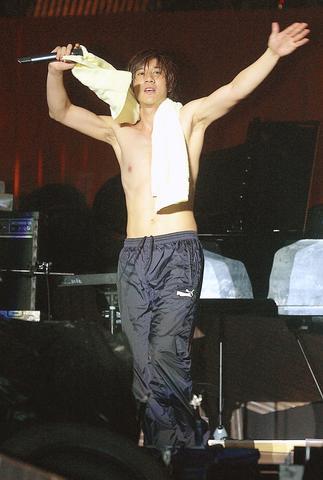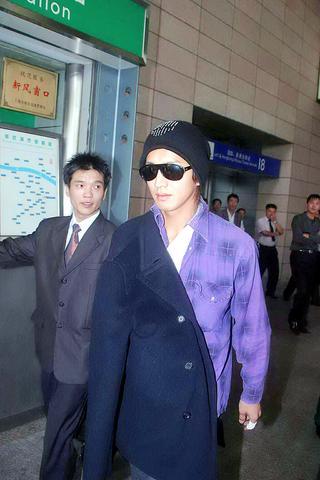Is there a community standard dictating how low pants can ride before they become indecent? Next Magazine (
Speaking of plumbers and not wearing underwear, A-hsian (
The path from smut to stardom is a well-worn one in Taiwan, having been taken by such stars as Shu Qi (舒淇) and Vivian Hsu (徐若瑄), the latter of whom said Saturday on the SET TV show Cover Person (封面人物) that she had no regrets about shooting a nude photo book 10 years ago. She also said on the show that her only true love has been the Japanese rock star Sugizo. Of her previous liaisons with the Japanese singer Gackt and Jay Chou (周杰倫), she said they were all just friends.

TAIPEI TIMES FILE PHOTO
Gackt and Vivian had a chance to see each other again last Saturday at Lee Hom Wang's (王力宏) concert, which went off without a hitch and was attended by about 20,000 screaming teenage girls and a few dozen boys, give or take a few. After eight years in the public view as a singer and heart-throb, this was Lee Hom's first headlining concert, so he came out strong playing guitar, piano, drums and rapping to prove his mettle as more than just another pretty face.
The other big show last weekend was the one in front of the Presidential Office for Double Ten Day. Shunza (順子), as a Golden Melody Award winner, was one of the most anticipated acts, but once onstage she made an ass of herself by singing off key and forgetting even the words to her own hit song Come Home (回家). The Apple Daily (
Fans of Wang Kar-wai (王家衛) will have to keep waiting for his next movie to finally come out. The film, titled 2046, was set to continue shooting last week in Shanghai, but for reasons unannounced, was postponed. Tetsuya Kimura (木村拓哉), the Japanese actor starring in the movie, had come all the way from Japan for the shoot, but ended up going home the next day with agents saying it was because he was sick. The suspicion, though, is that Tetsuya left in disgust when the filming was delayed at the last minute.

TAIPEI TIMES FILE PHOTO

May 26 to June 1 When the Qing Dynasty first took control over many parts of Taiwan in 1684, it roughly continued the Kingdom of Tungning’s administrative borders (see below), setting up one prefecture and three counties. The actual area of control covered today’s Chiayi, Tainan and Kaohsiung. The administrative center was in Taiwan Prefecture, in today’s Tainan. But as Han settlement expanded and due to rebellions and other international incidents, the administrative units became more complex. By the time Taiwan became a province of the Qing in 1887, there were three prefectures, eleven counties, three subprefectures and one directly-administered prefecture, with

It’s an enormous dome of colorful glass, something between the Sistine Chapel and a Marc Chagall fresco. And yet, it’s just a subway station. Formosa Boulevard is the heart of Kaohsiung’s mass transit system. In metro terms, it’s modest: the only transfer station in a network with just two lines. But it’s a landmark nonetheless: a civic space that serves as much more than a point of transit. On a hot Sunday, the corridors and vast halls are filled with a market selling everything from second-hand clothes to toys and house decorations. It’s just one of the many events the station hosts,

Among Thailand’s Chinese Nationalist Party (KMT) villages, a certain rivalry exists between Arunothai, the largest of these villages, and Mae Salong, which is currently the most prosperous. Historically, the rivalry stems from a split in KMT military factions in the early 1960s, which divided command and opium territories after Chiang Kai-shek (蔣介石) cut off open support in 1961 due to international pressure (see part two, “The KMT opium lords of the Golden Triangle,” on May 20). But today this rivalry manifests as a different kind of split, with Arunothai leading a pro-China faction and Mae Salong staunchly aligned to Taiwan.

Two moves show Taichung Mayor Lu Shiow-yen (盧秀燕) is gunning for Chinese Nationalist Party (KMT) party chair and the 2028 presidential election. Technically, these are not yet “officially” official, but by the rules of Taiwan politics, she is now on the dance floor. Earlier this month Lu confirmed in an interview in Japan’s Nikkei that she was considering running for KMT chair. This is not new news, but according to reports from her camp she previously was still considering the case for and against running. By choosing a respected, international news outlet, she declared it to the world. While the outside world